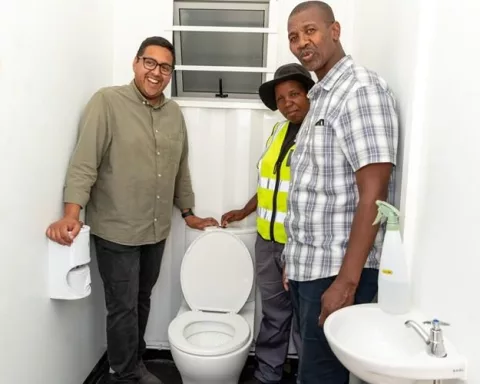South Africa is taking action to address the high rates of teenage pregnancy and HIV infection among young people by introducing Adolescent and Youth-Friendly Services (AYFS) in primary healthcare facilities. These youth-friendly zones aim to provide a supportive environment that is approachable and inviting for adolescents and young adults to seek vital healthcare services, such as reproductive health and family planning. The Emalangeni Clinic in Lusikisiki serves as a positive example of the success of these zones, encouraging more young people to access crucial healthcare services, which could lead to a reduction in teenage pregnancies and HIV infection rates.
How is South Africa addressing teenage pregnancy and HIV rates?
The South African government and health sector NGOs have introduced Adolescent and Youth-Friendly Services (AYFS) in primary healthcare facilities, also known as youth-friendly zones, to enhance access to healthcare services, particularly reproductive health and family planning services for young people. The Emalangeni Clinic in Lusikisiki serves as a positive example, encouraging more young people to seek crucial healthcare services, which could lead to a reduction in teenage pregnancies and HIV infection rates.
The South African government and health sector NGOs have come together to focus on the increasing concerns related to teenage pregnancy and high HIV infection rates among young people. They have introduced the Adolescent and Youth-Friendly Services (AYFS) in the Eastern Cape, also known as the youth-friendly zone. Deputy Minister Dr. Sibongiseni Dhlomo officially launched AYFS at the Emalangeni Clinic in Lusikisiki.
The authorities in South Africa acknowledge the pressing need to enhance access to healthcare services, particularly reproductive health and family planning services for the young population. Establishing youth-friendly zones in primary healthcare facilities aims to create a supportive environment that is approachable and inviting for adolescents and young adults.
A study conducted with participants between 10 and 19 years old showed alarming statistics regarding teenage pregnancies and HIV infections, emphasizing the need for interventions targeting this demographic. The research also discovered a considerable number of adolescent girls and young women were hesitant to visit primary health facilities due to judgemental healthcare worker attitudes and long waiting times.
Implementing Youth-Friendly Zones
To address these issues, the Department of Health has been actively introducing and expanding youth-friendly zones in various healthcare facilities. With the primary objective of providing young individuals with unhindered and straightforward access to health services, they primarily employ young health workers in these zones to better connect with their peers seeking advice and assistance.
The Emalangeni Clinic in Lusikisiki serves as a positive example for the Eastern Cape’s young residents. The establishment of the youth-friendly zone is expected to encourage more young people to seek crucial healthcare services, which could lead to a reduction in teenage pregnancies and HIV infection rates.
The Emalangeni Clinic’s launch event marked not only a new beginning for the local community but also a hopeful start for the entire Eastern Cape Province. Media representatives were invited to attend the launch on Thursday, 26 October, emphasizing the importance of raising awareness about this significant milestone in the fight against teenage pregnancy and HIV.
The Impact of Collaboration and Expansion
The collaboration between the government and health sector NGOs showcases a joint commitment to improving the health and well-being of South Africa’s younger generations. The development of youth-friendly zones in primary healthcare facilities will play a crucial role in addressing the challenges young people face in obtaining vital healthcare services.
As the implementation of more youth-friendly zones continues nationwide, it’s essential to focus on their core objectives: providing safe, non-judgmental spaces for young individuals to access healthcare services, cultivating trust and familiarity with healthcare providers, and empowering the youth to take charge of their health and well-being.
The Emalangeni Clinic’s youth-friendly zone will act as a model for other healthcare facilities throughout South Africa. By consistently prioritizing youth needs and customizing healthcare services to better serve their distinct necessities, we can hope for a healthier future for the next generation.
In summary, the introduction of Adolescent and Youth-Friendly Services in Eastern Cape marks a significant stride in tackling the pressing health issues faced by South Africa’s young population. The collective efforts of the government, NGOs, and dedicated healthcare workers will undoubtedly enhance the accessibility and quality of health services for the youth. By continuously implementing and expanding youth-friendly zones across the country, we can work towards building a healthier and more prosperous future for South Africa’s younger generations.
What are Adolescent and Youth-Friendly Services (AYFS)?
Adolescent and Youth-Friendly Services (AYFS) are youth-friendly zones in primary healthcare facilities that provide young individuals with unhindered and straightforward access to health services, particularly reproductive health and family planning services for young people.
Why is South Africa implementing youth-friendly zones?
South Africa is implementing youth-friendly zones to address the high rates of teenage pregnancy and HIV infection among young people. These zones aim to provide a supportive environment that is approachable and inviting for adolescents and young adults to seek vital healthcare services.
How is the Emalangeni Clinic in Lusikisiki a positive example of success?
The Emalangeni Clinic in Lusikisiki serves as a positive example of success as it has encouraged more young people to access crucial healthcare services, which could lead to a reduction in teenage pregnancies and HIV infection rates.
How are youth-friendly zones addressing the challenges young people face in obtaining vital healthcare services?
Youth-friendly zones in primary healthcare facilities provide safe, non-judgmental spaces for young individuals to access healthcare services, cultivating trust and familiarity with healthcare providers, and empowering the youth to take charge of their health and well-being.
What is the impact of collaboration and expansion in addressing these health issues?
The collaboration between the government and health sector NGOs showcases a joint commitment to improving the health and well-being of South Africa’s younger generations. The development of youth-friendly zones in primary healthcare facilities will play a crucial role in addressing the challenges young people face in obtaining vital healthcare services.
What is the significance of the Emalangeni Clinic’s launch event?
The Emalangeni Clinic’s launch event marked not only a new beginning for the local community but also a hopeful start for the entire Eastern Cape Province. Media representatives were invited to attend the launch, emphasizing the importance of raising awareness about this significant milestone in the fight against teenage pregnancy and HIV.
How will the Emalangeni Clinic’s youth-friendly zone act as a model for other healthcare facilities throughout South Africa?
The Emalangeni Clinic’s youth-friendly zone will act as a model for other healthcare facilities throughout South Africa by consistently prioritizing youth needs and customizing healthcare services to better serve their distinct necessities.
What is the overall impact of the implementation of Adolescent and Youth-Friendly Services in South Africa?
The implementation of Adolescent and Youth-Friendly Services in South Africa marks a significant stride in tackling the pressing health issues faced by South Africa’s young population. By continuously implementing and expanding youth-friendly zones across the country, we can work towards building a healthier and more prosperous future for South Africa’s younger generations.








